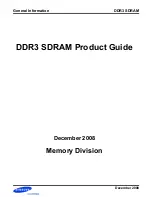
www.ti.com
2.7.2.1
Initializing the MDIO Module
2.7.2.2
Writing Data To a PHY Register
2.7.2.3
Reading Data From a PHY Register
Architecture
A round-robin arbitration scheme is used to schedule transactions that may be queued using both
USERACCESS0 and USERACCESS1. The application software must check the status of the GO bit in
USERACCESS
n
before initiating a new transaction, to ensure that the previous transaction has
completed. The application software can use the ACK bit in USERACCESS
n
to determine the status of a
read transaction.
The following steps are performed by the application software or device driver to initialize the MDIO
device:
1. Configure the PREAMBLE and CLKDIV bits in the MDIO control register (CONTROL).
2. Enable the MDIO module by setting the ENABLE bit in CONTROL.
3. The MDIO PHY alive status register (ALIVE) can be read in polling fashion until a PHY connected to
the system responded, and the MDIO PHY link status register (LINK) can determine whether this PHY
already has a link.
4. Setup the appropriate PHY addresses in the MDIO user PHY select register (USERPHYSEL
n
), and set
the LINKINTENB bit to enable a link change event interrupt if desirable.
5. If an interrupt on general MDIO register access is desired, set the corresponding bit in the MDIO user
command complete interrupt mask set register (USERINTMASKSET) to use the MDIO user access
register (USERACCESS
n
). Since only one PHY is used in this device, the application software can use
one USERACCESS
n
to trigger a completion interrupt; the other USERACCESS
n
is not setup.
The MDIO module includes a user access register (USERACCESS
n
) to directly access a specified PHY
device. To write a PHY register, perform the following:
1. Check to ensure that the GO bit in the MDIO user access register (USERACCESS
n
) is cleared.
2. Write to the GO, WRITE, REGADR, PHYADR, and DATA bits in USERACCESS
n
corresponding to the
PHY and PHY register you want to write.
3. The write operation to the PHY is scheduled and completed by the MDIO module. Completion of the
write operation can be determined by polling the GO bit in USERACCESS
n
for a 0.
4. Completion of the operation sets the corresponding USERINTRAW bit (0 or 1) in the MDIO user
command complete interrupt register (USERINTRAW) corresponding to USERACCESS
n
used. If
interrupts have been enabled on this bit using the MDIO user command complete interrupt mask set
register (USERINTMASKSET), then the bit is also set in the MDIO user command complete interrupt
register (USERINTMASKED) and an interrupt is triggered on the CPU.
The MDIO module includes a user access register (USERACCESS
n
) to directly access a specified PHY
device. To read a PHY register, perform the following:
1. Check to ensure that the GO bit in the MDIO user access register (USERACCESS
n
) is cleared.
2. Write to the GO, REGADR, and PHYADR bits in USERACCESS
n
corresponding to the PHY and PHY
register you want to read.
3. The read data value is available in the DATA bits in USERACCESS
n
after the module completes the
read operation on the serial bus. Completion of the read operation can be determined by polling the
GO and ACK bits in USERACCESS
n
. Once the GO bit has cleared, the ACK bit is set on a successful
read.
4. Completion of the operation sets the corresponding USERINTRAW bit (0 or 1) in the MDIO user
command complete interrupt register (USERINTRAW) corresponding to USERACCESS
n
used. If
interrupts have been enabled on this bit using the MDIO user command complete interrupt mask set
register (USERINTMASKSET), then the bit is also set in the MDIO user command complete interrupt
register (USERINTMASKED) and an interrupt is triggered on the CPU.
Ethernet Media Access Controller (EMAC)/Management Data Input/Output (MDIO)
36
SPRUEQ6 – December 2007
Submit Documentation Feedback















































